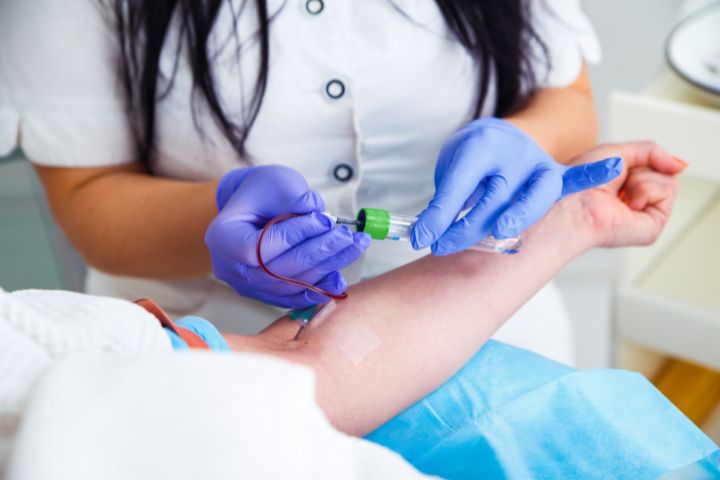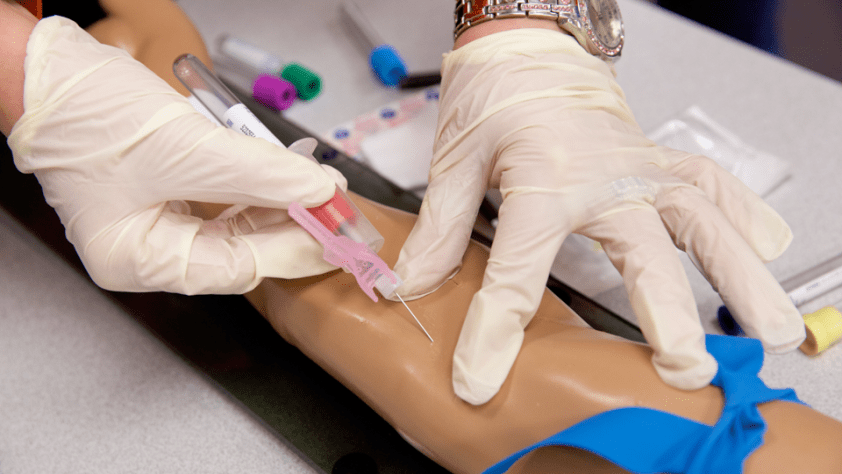The Course to Qualification: Recognizing the Phlebotomy Educating Course Journey and Its Importance
As you think about the path to certification in phlebotomy, it's vital to recognize the function you'll play in health care. Your training will cover important abilities, from blood collection techniques to patient interaction.

The Function of Phlebotomists in Healthcare
Phlebotomists play an essential function in the medical care system, acting as the essential link in between patients and crucial analysis testing. You'll do blood draws, making certain samples are accumulated accurately and securely. Your experience assists in diagnosing medical conditions, checking health and wellness, and leading therapy choices.
In your everyday communications, you'll require to establish count on with patients, making them really feel comfy throughout what could be a stressful experience. You are accountable for classifying and dealing with examples meticulously to stop contamination or errors, which can affect examination outcomes.
Past this, you'll often function alongside physicians and nurses, communicating crucial info concerning people' problems. By mastering your skills, you contribute meaningfully to client care, making you a vital part of the clinical team.
Overview of Phlebotomy Training Programs
When exploring phlebotomy training programs, you'll discover various types designed to fit different timetables and discovering designs. Each program helps you establish crucial abilities like blood collection and patient interaction. Comprehending these choices is crucial to choosing the best course for your job.
Sorts Of Training Programs
Several types of training programs are readily available for those looking to come to be skillful in phlebotomy. Additionally, some hospitals and clinics use on-the-job training programs, providing sensible experience while you learn. Whatever course you choose, each program intends to furnish you with the necessary skills for a successful phlebotomy profession.

Key Skills Established
Grasping phlebotomy needs a set of crucial skills that are developed through complete training programs. You'll discover technological abilities like proper blood vessel option, needle insertion, and blood collection techniques. These hands-on techniques guarantee you can carry out procedures securely and successfully. In addition, interaction skills are fundamental; you'll require to engage with people, discuss treatments, and put them at ease. Recognizing anatomy and physiology is important, too, as it aids you locate capillaries and recognize the body's reaction to blood draws. You'll acquire knowledge of safety methods and infection control, assuring you preserve a sterilized atmosphere. Each of these abilities is vital for your success as a licensed phlebotomist, making you a valuable asset in any type of health care setup.
Trick Elements of a Phlebotomy Program
In a phlebotomy program, you'll concentrate on crucial subjects that lay the groundwork for your future profession. You'll engage in hands-on training that enables you to apply what you have actually learned in real-world settings. Both the core educational program and useful experience are essential for your success as a phlebotomist.
Core Curriculum Introduction
While going after a phlebotomy training program, you'll come across a curriculum made to furnish you with basic skills and understanding. Phlebotomy Training Course. This educational program normally includes composition and physiology, concentrating on the blood circulation system and comprehending blood elements. You'll also discover different kinds of blood collection methods, including venipuncture and capillary leak methods
In addition, infection control and safety procedures are necessary elements, ensuring you know how to maintain a clean and sterile environment. You'll research patient communication, stressing communication and empathy, which are vital for reducing person anxiousness. Ultimately, ethical and legal factors to consider will be dealt with, preparing you for real-world obligations. This foundational understanding will certainly enable you to succeed as a phlebotomist and give quality care in professional setups.
Hands-On Training Experience
Getting hands-on experience is a crucial component of your phlebotomy training program. This functional training allows you to apply what you've discovered in a real-world setting, boosting your skills and confidence. Phlebotomy school.
Furthermore, you'll obtain the chance to interact with individuals, which is vital for creating your communication skills. This combination of technical effectiveness and interpersonal abilities is vital for your success as a licensed phlebotomist. Ultimately, hands-on training is where concept fulfills technique, strengthening your understanding and preparedness for accreditation.
Accreditation and Licensing Demands
Before you can start your career in phlebotomy, it is important to understand the accreditation and licensing needs that differ by state. Most states require phlebotomists to hold a qualification from a recognized company, such as the National Phlebotomy Organization or the American Culture for Medical Pathology. These accreditations commonly involve passing an examination that evaluates your understanding and skills in the area.
In enhancement to qualification, some states have specific licensing needs. You may need to finish a specific number of hours in medical practice, submit proof of training, or undertake a history check. It is necessary to research your state's regulations to make certain you fulfill all required standards.
Staying educated about these demands not only helps you secure a placement however likewise improves your credibility as a specialist. By fulfilling these demands, you'll be well on your method to an effective profession in phlebotomy.
Hands-On Training and Practical Experience
Hands-on training and practical experience are crucial elements of your phlebotomy education, as they allow you to use theoretical knowledge in real-world circumstances. Throughout your training, you'll participate in supervised venipuncture, learn proper strategies, and come to be knowledgeable about numerous blood collection devices. This direct involvement is vital for constructing your confidence and honing your abilities.
You'll function closely with seasoned experts that can direct you through the nuances of client interaction and sample handling. Each practice not only enhances your understanding however likewise prepares you for the hectic setting of healthcare setups.
In addition, several programs include medical rotations, enabling you to experience varied settings, from medical facilities to outpatient facilities. This direct exposure aids useful reference you adjust to various difficulties and client needs, guaranteeing you're well-prepared for your future duty. Accept these opportunities, as they're important to ending up being a competent and thoughtful phlebotomist.
Difficulties Faced During Training
While gaining hands-on experience is crucial, it is very important to identify the difficulties that can occur throughout your phlebotomy training. You might come across stress and anxiety when performing procedures on genuine individuals, specifically if you're new to the setting. The stress to obtain every little thing right can be frustrating. Furthermore, understanding the abilities required for blood draws takes technique; you might fight with method originally.
Time monitoring can additionally be a hurdle, as balancing concept, functional sessions, and personal commitments can feel intimidating. You may face varying finding out speeds among your peers, causing feelings of self-doubt if you think you're falling behind. Adjusting to the different individualities of teachers can be tough, as each might have an one-of-a-kind teaching design.
Acknowledging these obstacles early can prepare you for success and aid you establish durability throughout your training trip.
Profession Opportunities After Qualification

As you acquire experience, you may even take into consideration concentrating on locations like pediatric or geriatric phlebotomy, catering to particular patient needs. Some phlebotomists choose to progress their occupations by ending up over here being laboratory technicians or seeking more education in medical care areas.
Furthermore, your certification can bring about duties in training or monitoring brand-new phlebotomists, permitting you to share your knowledge. With the health care market consistently growing, your skills will constantly be in need, paving the means for a stable and satisfying job. Accept the opportunities awaiting you!
Often Asked Questions
What Is the Typical Duration of a Phlebotomy Training Program?
Phlebotomy training programs commonly last around 4 to eight weeks. You'll participate in hands-on method, class instruction, and online learning. Finishing this training prepares you for certification and a rewarding occupation in healthcare.
Are Online Phlebotomy Courses Available?
Yes, online phlebotomy programs are offered. They use versatility and comfort, allowing you to study at your own pace. Just confirm the program is certified to satisfy certification demands and obtain beneficial skills for your occupation.
Just How Much Does Phlebotomy Training Normally Price?
Phlebotomy training commonly costs between $700 and $2,500, depending on the program and place. You should think about elements like training course size, included products, and hands-on experience when picking the right training for you.
What Prevail Prerequisites for Phlebotomy Training?
Typical requirements for phlebotomy training often include a senior high school diploma or GED, booster shots, and a history check. Some programs might additionally need basic read this article health care expertise or accreditations, guaranteeing you're prepared for hands-on training.
Can I Work While Finishing My Phlebotomy Training?
Yes, you can work while completing your phlebotomy training. Numerous trainees balance tasks with their studies, however make sure to handle your time effectively to assure you satisfy both work and training commitments successfully.
Comments on “Phlebotomy school vs Other Healthcare Paths: A Comparative Guide”